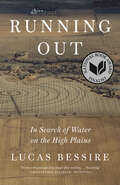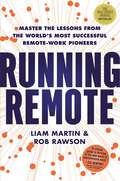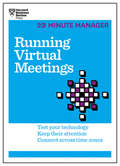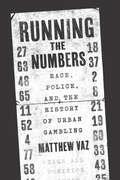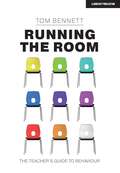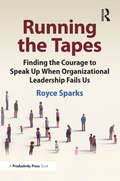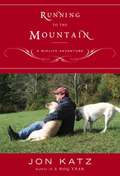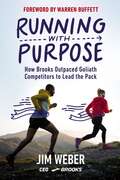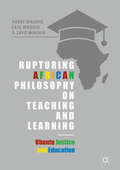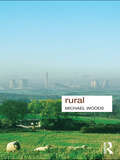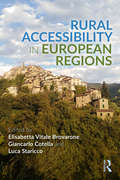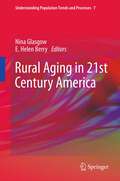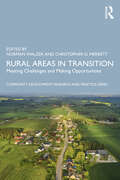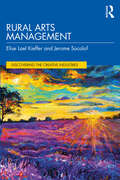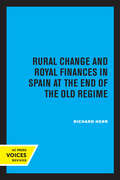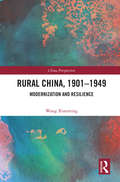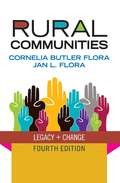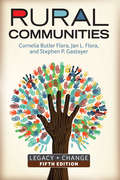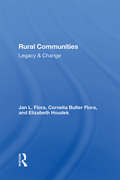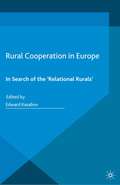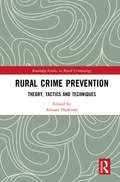- Table View
- List View
Running Out: In Search of Water on the High Plains
by Lucas BessireFinalist for the National Book AwardAn intimate reckoning with aquifer depletion in America's heartlandThe Ogallala aquifer has nourished life on the American Great Plains for millennia. But less than a century of unsustainable irrigation farming has taxed much of the aquifer beyond repair. The imminent depletion of the Ogallala and other aquifers around the world is a defining planetary crisis of our times. Running Out offers a uniquely personal account of aquifer depletion and the deeper layers through which it gains meaning and force.Anthropologist Lucas Bessire journeyed back to western Kansas, where five generations of his family lived as irrigation farmers and ranchers, to try to make sense of this vital resource and its loss. His search for water across the drying High Plains brings the reader face to face with the stark realities of industrial agriculture, eroding democratic norms, and surreal interpretations of a looming disaster. Yet the destination is far from predictable, as the book seeks to move beyond the words and genres through which destruction is often known. Instead, this journey into the morass of eradication offers a series of unexpected discoveries about what it means to inherit the troubled legacies of the past and how we can take responsibility for a more inclusive, sustainable future.An urgent and unsettling meditation on environmental change, Running Out is a revelatory account of family, complicity, loss, and what it means to find your way back home.
Running Remote: Master the Lessons from the World’s Most Successful Remote-Work Pioneers
by Liam Martin Rob RawsonWall Street Journal and Publishers Weekly BestsellerLearn success secrets from original remote work pioneers on the mindset and strategies they developed to build and grow successful organizations from the ground up.With the unprecedented rise in remote work due to the pandemic, many businesses have struggled with how to effectively transition to a distributed format. Meanwhile, companies who had always been remote-first had a unique advantage: a highly scalable set of work processes, a unique communication style, and the proper &“async mindset&” required to succeed without an office. This groundbreaking guide unlocks the secrets and the lessons discovered by those pioneer entrepreneurs and founders who have figured out how to harness the async mindset and grow their businesses remotely in the most the seamless, freeing, and cost-effective ways.Once you accept and master some fundamental differences, remote work can fuel higher productivity, eliminate time-wasting meetings and treacherous commutes, and strip away the ugly politics that often undermine the most talented employees. It also leads to great cultural inclusivity and richer cultural exchange. Running Remote is for ventures of all stripes—companies small and large, one-person operations, mom-and-pop shops, and global mega-corporations. The lessons herein are as valuable for on-premises organizations as they are for the tech worker. Readers will:Master the fundamentals of the async mindset by exploring three overarching principles—deliberate overcommunication, democratized workflow, and detailed metrics.Learn nuts-and-bolts techniques and real-life lessons from remote work trailblazers who built successful all-remote organizations prior to the pandemic.Gain a better understanding of why hiring, on-ramping, and managing in a remote context is totally different—again with methods and first-hand stories from the founders and leaders that did it first.Lean how moving to a remote business model impacts traditional management and work processes.
Running Virtual Meetings (HBR 20-Minute Manager Series)
by Harvard Business ReviewFrom crackly conference lines to pixelated video, virtual meetings can be problematic. But you can host a productive conversation in which everyone participates. Running Virtual Meetings takes you through the basics of: Selecting the right virtual venue Giving participants the information and support they need to connect and contribute Establishing and enforcing a common meeting etiquette Following up from afarDon't have much time? Get up to speed fast on the most essential business skills with HBR's 20-Minute Manager series. Whether you need a crash course or a brief refresher, each book in the series is a concise, practical primer that will help you brush up on a key management topic. Advice you can quickly read and apply, for ambitious professionals and aspiring executives-from the most trusted source in business. Also available as an ebook.
Running the Numbers: Race, Police, and the History of Urban Gambling (Historical Studies of Urban America)
by Matthew VazEvery day in the United States, people test their luck in numerous lotteries, from state-run games to massive programs like Powerball and Mega Millions. Yet few are aware that the origins of today’s lotteries can be found in an African American gambling economy that flourished in urban communities in the mid-twentieth century. In Running the Numbers, Matthew Vaz reveals how the politics of gambling became enmeshed in disputes over racial justice and police legitimacy. As Vaz highlights, early urban gamblers favored low-stakes games built around combinations of winning numbers. When these games became one of the largest economic engines in nonwhite areas like Harlem and Chicago’s south side, police took notice of the illegal business—and took advantage of new opportunities to benefit from graft and other corrupt practices. Eventually, governments found an unusual solution to the problems of illicit gambling and abusive police tactics: coopting the market through legal state-run lotteries, which could offer larger jackpots than any underground game. By tracing this process and the tensions and conflicts that propelled it, Vaz brilliantly calls attention to the fact that, much like education and housing in twentieth-century America, the gambling economy has also been a form of disputed terrain upon which racial power has been expressed, resisted, and reworked.
Running the Room: The Teacher’s Guide to Behaviour
by Tom BennettGood behaviour is the beginning of great learning. All children deserve classrooms that are calm, safe spaces where everyone is treated with dignity. Creating that space is one of the most important things a teacher needs to be able to do. But all too often teachers begin their careers with the bare minimum of training – or worse, none. How students behave, socially and academically, dictates whether or not they will succeed or struggle in school. Every child comes to the classroom with different skills, habits, values and expectations of what to do. There’s no point just telling a child to behave; behaviour must be taught. Behaviour is a curriculum. This simple truth is the beginning of creating a classroom culture where everyone flourishes, pupils and staff.Running the Room is the teacher’s guide to behaviour. Practical, evidence informed, and based on the expertise of great teachers from around the world, it addresses the things teachers really need to know to build the classrooms children need. Bursting with strategies, tips and solid advice, it brings together the best of what we know and saves teachers, new or old, from reinventing the wheels of the classroom. It’s the book teachers have been waiting for.
Running the Room: The Teacher’s Guide to Behaviour
by Tom BennettGood behaviour is the beginning of great learning. All children deserve classrooms that are calm, safe spaces where everyone is treated with dignity. Creating that space is one of the most important things a teacher needs to be able to do. But all too often teachers begin their careers with the bare minimum of training – or worse, none. How students behave, socially and academically, dictates whether or not they will succeed or struggle in school. Every child comes to the classroom with different skills, habits, values and expectations of what to do. There’s no point just telling a child to behave; behaviour must be taught. Behaviour is a curriculum. This simple truth is the beginning of creating a classroom culture where everyone flourishes, pupils and staff.Running the Room is the teacher’s guide to behaviour. Practical, evidence informed, and based on the expertise of great teachers from around the world, it addresses the things teachers really need to know to build the classrooms children need. Bursting with strategies, tips and solid advice, it brings together the best of what we know and saves teachers, new or old, from reinventing the wheels of the classroom. It’s the book teachers have been waiting for.
Running the Tapes: Finding the Courage to Speak Up When Organizational Leadership Fails Us
by Royce SparksThis practical and accessible exploration of ethics in organizational leadership contains several underlying themes: first, that even the most morally stalwart organizations are vulnerable to the ethical challenges that come from failings of leadership, particularly executive leadership. A great focus today is being paid to the idea of toxic work environments, and while explorations of culture, team building, and language are all valuable pieces of this discussion, at its heart this is a question of leadership. Stripping away authority as a requisite for leadership empowers everyone at all levels of an organization to take a higher level of ownership over their leadership skills, to become a voice of action and protection for their teammates and the organization when the conventional safeguards of the workplace fail them. The common term for these individuals may be whistleblowers, but rather, are they instead models of leadership that organizations should be paying closer attention to? By drawing a constant dividing line between ethics and organizational interests, have we been missing a key middle ground this entire time? By redefining the boundaries of leadership through the lens of how to take action in a hostile workplace environment, this book offers a series of accessible strategies, principles, and examples that can be easily followed regardless of rank or position. Based on his consulting work, the author recounts actual ethical investigations of egregious workplace violations. To make this book even more valuable, the author offers strategies for how to parse grievances from genuine wrongdoings, make decisions about how to handle delicate information, choose allies wisely, and prepare for both the consequences and sometimes benefits of bringing organizational wrongdoings to light. Finally, this book aims to inspire courage, nurture leadership growth at all levels, and offer leaders in positions of power a clear case for why opting for environments of ethical accountability is synonymous, rather than at odds, with an organization’s self-interest.
Running to the Mountain: A Midlife Adventure
by Jon KatzJon Katz, a respected journalist, father, and husband, was turning fifty. His writing career had taken a dubious turn, his wife had a demanding career of her own, his daughter was preparing to leave home for college, and he had become used to a sedentary lifestyle. Wonderfully witty and insightful, Running to the Mountain chronicles Katz's hunger for change and his search for renewed purpose and meaning in his familiar world. Armed with the writings of Thomas Merton and his two faithful Labradors, Katz trades in his suburban carpool-driving and escapes to the mountains of upstate New York. There, as he restores a dilapidated cabin, learns self-reliance in a lightning storm, shares a bottle of Glenlivet with unexpected ghosts, and helps a friend prepare for fatherhood, he confronts his lifelong questions about spirituality, mortality, and his own self-worth. He ultimately rediscovers a profound appreciation for his work, his family, and the beauty of everyday life--and provides a glorious lesson for us all.
Running with Purpose: How Brooks Outpaced Goliath Competitors to Lead the Pack
by Jim WeberDiscover how Brooks Running Company CEO Jim Weber transformed a failing business into a billion-dollar brand in the ultracompetitive global running market. Running with Purpose is a leadership memoir with insights, inspirational stories, and tangible takeaways for current and aspiring leaders, entrepreneurs, and the 150+ million runners worldwide and those in the broader running community who continually invest in themselves.This leadership memoir starts with Jim Weber's seventh-grade dream to run a successful company that delivered something people passionately valued. Fast forward to 2001, Jim became the CEO of Brooks and, as the struggling brand's fourth CEO in two years, he faced strong headwinds. A lifelong competitor, Jim devised a one-page strategy that he believed would not only save the company but would also lay the foundation for Brooks to become a leading brand in the athletic, fitness, and outdoor categories. To succeed, he had to get his team to first believe it was possible and then employ the conviction, fortitude, and constancy of purpose to outperform larger brands. Brooks' success was validated when Warren Buffett made it a standalone Berkshire Hathaway subsidiary in 2012. In the pages of Running with Purpose, you will find:Brooks&’ bold strategy and unique brand positioning that fueled its move from the back of the pack to lead.The key to building a purpose-driven brand that is oriented around customer obsession, building trust, competing with heart, and having fun along the way.The six clear leadership lessons Jim has learned along his path and applies at Brooks to develop staff into authentic leaders.How Berkshire Hathaway's support and influence provided a tailwind for Brooks' business and brand to surge.An inside look at the ups and downs of Jim's personal journey, which led to his conviction that life is too short not to enjoy what you do and the people by your side.
Rupturing African Philosophy on Teaching and Learning: Ubuntu Justice And Education
by Yusef Waghid Faiq Waghid Zayd WaghidThis book examines African philosophy of education and the enactment of ubuntu justice through a massive open online course on Teaching for Change. The authors argue that such pedagogic encounters have the potential to stimulate just and democratic human relations: encounters that are critical, deliberate, reflective and compassionate could enable just and democratic human relations to flourish, thus inducing decolonisation and decoloniality. Exploring arguments for imaginative and tolerant pedagogic encounters that could help cultivate an African university where educators and students can engender morally and politically responsible pedagogical actions, the authors offer pathways for thinking more imaginatively about higher education in a globalised African context. This work will be of value for researchers and students of philosophy of education, higher education and democratic citizenship education.
Rural
by Michael WoodsThe division of ‘rural’ and ‘urban’ is one of the oldest ideas in Geography and is deeply engrained in our culture. Throughout history, the rural has been attributed with many meanings: as a source of food and energy; as a pristine wilderness, or as a bucolic idyll; as a playground, or a place of escape; as a fragile space of nature, in need of protection; and as a primitive place, in need of modernization. But is the idea of the rural still relevant today? Rural provides an advanced introduction to the study of rural places and processes in Geography and related disciplines. Drawing extensively on the latest research in rural geography, this book explores the diverse meanings that have been attached to the rural, examines how ideas of the rural have been produced and reproduced, and investigates the influence of different ideas in shaping the social and economic structure of rural localities and the everyday lives of people who live, work or play in rural areas. This authoritative book contains case studies drawn from both the developed and developing world to introduce and illustrate conceptual ideas and approaches, as well as suggested further reading. Written in an engaging and lively style, Rural challenges the reader to think differently about the rural.
Rural Accessibility in European Regions
by Giancarlo Cotella Elisabetta Vitale Brovarone Luca StariccoRural Accessibility in European Regions explores concepts, methodologies, and case studies dealing with accessibility in European rural areas, embracing cultural, socioeconomic, and governance aspects that play a key role for accessibility policies in rural and peripheral areas. In the first part, the chapters introduce rural accessibility challenges, present a methodology to support policymaking for enhancing accessibility in rural areas and apply it to case studies in the United Kingdom, Italy, Spain, and Sweden. In the second part, additional cases from Poland, Germany, Greece, and France provide alternative approaches to the topic, and a research agenda is proposed. Overall, the book contributes to a conceptualisation of rural accessibility, addressing challenges and potentials for rural accessibility and urban–rural relationships in European regions. The book fills a gap in the existing bodies of literature on accessibility and on rural planning, bridging the two spheres with an interdisciplinary approach to rural accessibility for mobility, planning, and regional studies.
Rural Aging in 21st Century America
by J. V. Edmund Nina Glasgow E. Helen BerryThis book investigates sociological, demographic and geographic aspects of aging in rural and nonmetropolitan areas of the United States. Population aging is one of the most important trends of the 20th and 21st centuries, and it is occurring worldwide, especially in more developed countries such as the United States. Population aging is more rapid in rural than urban areas of the U.S. In 2010, 15 percent of the nonmetropolitan compared to 12 percent of the metropolitan population were 65 years of age and older. By definition rural communities have smaller sized populations, and more limited healthcare, transportation and other aging-relevant services than do urban areas. It is thus especially important to study and understand aging in rural environments. Rural Aging in 21st Century America contributes evidence-based, policy-relevant information on rural aging in the U.S. A primary objective of the book is to improve understanding of what makes the experience of rural aging different from aging in urban areas and to increase understanding of the aged change the nature of rural places. The book addresses unique features of rural aging across economic, racial/ethnic, migration and other structures and patterns, all with a focus on debunking myths about rural aging and to emphasize opportunities and challenges that rural places and older people experience.
Rural Areas in Transition: Meeting Challenges & Making Opportunities (Community Development Research and Practice Series)
by Norman Walzer Christopher D. MerrettThis volume explores new opportunities to reshape local economies in rural areas during the next decade by exploring successful efforts already underway. While reported population declines can paint a bleak picture for rural areas, a different story can be told in looking at the numbers of households, employment, and housing markets. In fact, many rural areas have had steady employment and healthy housing markets. Rural attractions often include proximity to natural recreation areas, personal safety, social interaction, less expensive housing, and high-quality education. This book shows that rural areas are in a major long-term transition and that local leaders who take advantage of these opportunities in their community and economic development strategies can create a very positive future for residents. Students and policymakers in local economic development, sociology of population change, business finance, political economy, and geography will find this a useful resource.
Rural Arts Management (Discovering the Creative Industries)
by Elise Lael Kieffer Jerome SocolofThe arts and arts management exist in every corner of the world, from the largest city to the smallest town. However, just as a metropolis and a hamlet bear little resemblance to each other despite similar basic needs, arts organizations in the former frequently bear little resemblance to those in the latter, and many foundational arts management texts give little attention to rural settings. This book combines insights from research and practice to fill that knowledge gap and help readers understand arts administration in rural communities.Focusing on the North American setting but including comparative examples and references from around the world, this book examines how areas of practice familiar to any arts manager work in rural areas, including research and best practices for navigating the paucity of resources frequently encountered in rural communities. Emphasizing a “by rural, for rural” perspective, this book frames the arts as integral components of vibrant rural communities and valuable tools for meeting these communities’ needs.Written by arts and nonprofit management professors with backgrounds in rural arts research and practice, this book provides a valuable resource for scholars, advanced students and reflective practitioners at the intersection of the arts and rural studies.
Rural Change and Royal Finances in Spain at the End of the Old Regime
by Richard HerrThis title is part of UC Press's Voices Revived program, which commemorates University of California Press’s mission to seek out and cultivate the brightest minds and give them voice, reach, and impact. Drawing on a backlist dating to 1893, Voices Revived makes high-quality, peer-reviewed scholarship accessible once again using print-on-demand technology. This title was originally published in 1989.
Rural China, 1901–1949: Modernization and Resilience (China Perspectives)
by Wang XianmingHighlighting the interwoven relationship between Chinese rural society and larger historical forces, this book charts the evolution of China’s rural society from 1901 to 1949, concentrating on the major changes of this period and the scenarios developed to modernize rural society during the half century leading up to the Revolution. The modern history of rural China is one of sweeping institutional and structural transformation across many dimensions. As the first half of the twentieth century unfolded, against a backdrop of turbulent changes across a country that underwent industrialization, urbanization and modernization, China's agriculture, rural population and rural communities encountered many crises, but also showed remarkable resilience and capacity for adaptation and reform. In each of the six chapters, the author delves into one aspect or examines one period of this massive transformation, and identifies the social, economic, political and cultural significance of these tumultuous processes at work. The book will appeal to both scholars and general readers interested in modern Chinese history and the transformation of rural China.
Rural Communities
by Cornelia Butler Flora Jan L. FloraRural Communities: Legacy and Changeexamines the diversity of rural America: its unique communities, histories, and social issues. It also considers how rural communities use their increasing connectedness to creatively address modern challenges in the face of increasing globalization and climate change. Focusing on various capitals in rural areas-natural, cultural, human, social, political, financial, and built-this book provides students with an essential framework for understanding rural society based on the concepts of social science. As the only true core text available for rural sociology courses,Rural Communitiescovers vital issues such as: racial and cultural diversity in rural areas; globalization and increasing tensions over international immigration; the impact of the wars in Iraq and Afghanistan; the central role of communities in organizing a sustainable future; and building community in the context of ubiquitous change. Chapter opening vignettes present real people and communities, illustrating the application of concepts. The fourth edition ofRural Communitiesis updated with 2010 Census data and features new coverage of local food movements, climate change, the impacts of the global financial crisis, and updates on immigration as it relates to rural societies.
Rural Communities
by Cornelia Butler Flora Jan L FloraRural Communities: Legacy and Change examines the diversity of rural America: its unique communities, histories, and social issues. It also considers how rural communities use their increasing connectedness to creatively address modern challenges in the face of increasing globalization and climate change. Focusing on various capitals in rural areas--natural, cultural, human, social, political, financial, and built--this book provides students with an essential framework for understanding rural society based on the concepts of social science. The fourth edition of Rural Communities covers vital issues such as: racial and cultural diversity in rural areas; globalization and increasing tensions over international immigration; the impact of the wars in Iraq and Afghanistan; the central role of communities in organizing a sustainable future; and building community in the context of ubiquitous change. Chapter opening vignettes present real people and communities, illustrating the application of concepts. Updated with 2010 Census data, the fourth edition features new coverage of local food movements, climate change, the impacts of the global financial crisis, and updates on immigration as it relates to rural societies.
Rural Communities
by Cornelia Butler Flora Jan L. FloraRural Communities: Legacy and Change examines the diversity of rural America: its unique communities, histories, and social issues. It also considers how rural communities use their increasing connectedness to creatively address modern challenges in the face of increasing globalization and climate change. Focusing on various capitals in rural areas--natural, cultural, human, social, political, financial, and built--this book provides students with an essential framework for understanding rural society based on the concepts of social science. The fourth edition of Rural Communities covers vital issues such as: racial and cultural diversity in rural areas; globalization and increasing tensions over international immigration; the impact of the wars in Iraq and Afghanistan; the central role of communities in organizing a sustainable future; and building community in the context of ubiquitous change. Chapter opening vignettes present real people and communities, illustrating the application of concepts. Updated with 2010 Census data, the fourth edition features new coverage of local food movements, climate change, the impacts of the global financial crisis, and updates on immigration as it relates to rural societies.
Rural Communities
by Cornelia Butler Flora Jan L. Flora Stephen P. GasteyerCommunities in rural America are a complex mixture of peoples and cultures, ranging from miners who have been laid off in West Virginia, to Laotian immigrants relocating in Kansas to work at a beef processing plant, to entrepreneurs drawing up plans for a world-class ski resort in California's Sierra Nevada. Rural Communities: Legacy and Change uses its unique Community Capitals framework to examine how America’s diverse rural communities use their various capitals--natural, cultural, human, social, political, financial, and built--to address the modern challenges that face them. Each chapter opens with a case study of a community facing a particular challenge, and is followed by a comprehensive discussion of sociological concepts to be applied to understanding the case. This narrative, topical approach makes the book accessible and engaging for undergraduate students, while its integrative approach provides them with a framework for understanding rural society based on the concepts and explanations of social science This fifth edition is updated throughout with 2013 census data and features new and expanded coverage of health and health care, food systems and alternatives, the effects of neoliberalism and globalization on rural communities, as well as an expanded resource and activity section at the end of each chapter.
Rural Communities
by Cornelia Butler Flora Jan L. Flora Stephen P. GasteyerCommunities in rural America are a complex mixture of peoples and cultures, ranging from miners who have been laid off in West Virginia, to Laotian immigrants relocating in Kansas to work at a beef processing plant, to entrepreneurs drawing up plans for a world-class ski resort in California's Sierra Nevada. Rural Communities: Legacy and Change uses its unique Community Capitals framework to examine how America’s diverse rural communities use their various capitals--natural, cultural, human, social, political, financial, and built--to address the modern challenges that face them. Each chapter opens with a case study of a community facing a particular challenge, and is followed by a comprehensive discussion of sociological concepts to be applied to understanding the case. This narrative, topical approach makes the book accessible and engaging for undergraduate students, while its integrative approach provides them with a framework for understanding rural society based on the concepts and explanations of social science This fifth edition is updated throughout with 2013 census data and features new and expanded coverage of health and health care, food systems and alternatives, the effects of neoliberalism and globalization on rural communities, as well as an expanded resource and activity section at the end of each chapter.
Rural Communities Study Guide: Legacy + Change
by Jan L. Flora Mark Weinberg Cornelia Flora Elizabeth HoudekThis book examines the process of rural community development and transition—exploring the ways in which history, culture, and policies limit change as well as the extent to which local community resources can mobilize to support efforts for community change.
Rural Cooperation in Europe
by Edward KasabovThis collection analyses various European rural locations through a relational lens, attending to key aspects and dimensions of the 'relational rurals' such as cooperation, contestation, solidarity and consensus. By observing rural settings in such terms, contributors are able to rethink European rurality from a distinctly relational perspective.
Rural Crime Prevention: Theory, Tactics and Techniques (Routledge Studies in Rural Criminology)
by Alistair HarknessRural crime has long been overlooked in the field of crime prevention. Sustained academic interrogation is necessary, therefore, to reduce the extensive economic and social costs of rural crime as well as to challenge some of the myths regarding the prevention of rural crime. Rural Crime Prevention: Theory, Tactics and Techniques critically analyses, challenges, considers and assesses a suite of crime prevention initiatives across an array of international contexts. This book recognises the diversity and distinct features of rural places and the ways that these elements impact on rates, experiences and responses. Crucially, Rural Crime Prevention also incorporates non-academic voices which are embedded throughout the book, linking theory and scholarship with practice. Proactive responses to rural offending based on sound evidence can serve to facilitate feelings of safety and security throughout communities, enhance individual wellbeing and alleviate pressure on the overburdened and typically under-resourced formal elements of the criminal justice system. This book provides an opportunity to focus on the prevention of crime in regional, rural and remote parts of the globe. An accessible and compelling read, this book will appeal to students and scholars of criminology, policing, sociology and practitioners interested in learning about the best-practice international approaches to rural crime prevention in the twenty-first century.
